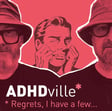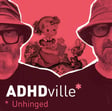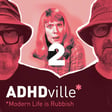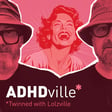Introduction and Podcast Purpose
00:00:00
Speaker
Hello and all right before we begin this podcast I just want to say this is part one of two because we chatted for so long so we mention a quiz that will be on the end of part two all right all right well let's get into it let's get into the room oh we're back in the room back in the room back in the room oh you know what I've I've just got like a tickly throat now weirdly just as we hit that button Oh, okay. I've got to tickle it up. Anyway, all right. So this episode is for anyone in the ADHD and or LDHD community who struggle living by the neuro beige rule book. Rule rule book.
00:00:48
Speaker
that has caused shaming, what the fuck syndrome, and is often the greatest cause of burnout. Right, Paul? Yes. Yes, it is. Yes. Sadly, does the modern world feel like it was built to mess with your ADHD brain from constant notifications and grind culture to time blindness and financial struggles we're breaking down, as Paul and I,
00:01:13
Speaker
why life feels so overwhelming. So let's go to a place where the distractions are landmarks and detours are the main roads. Welcome
Meet the Hosts: ADHD Journeys
00:01:51
Speaker
and ten Hello, my name is Paul Thompson. I was diagnosed with the combined ADHD 15-ish months ago. o And I'm Martin Weston. I was diagnosed with the combined ADHD poo poo platter in 2013.
00:02:07
Speaker
So we're here as two by two by coincidence or not in brackets after 39 years of fresh it discover that we're co ADHD is now it's really important to say this is an entertainment podcast about ADHD adult ADHD and does not substitute for individualized advice from qualified health professionals.
ADHDville: A Metaphorical Exploration
00:02:29
Speaker
So don't take any advice from him or him.
00:02:34
Speaker
We're just here as a kind of all-inclusive ADHD pop page with room for everyone, including your double gangers, your alter egos, you but double your doubles, your chaperones, and even your best buddies. Still here. yes Congratulations. You've earned yourself a ah low loyalty badge, right? Stand still.
00:02:54
Speaker
pinning on you. grab So grab your jetpacks, your petal hose, your space hoppers or any other transportation reference. And let us take you to ATD Mill, an imaginary town with strange accents that we've created in our minds. It's where we like to explore different parts of the ADH and the D again. Lovely. And we start well. I have to say,
00:03:22
Speaker
We are not starting off as always in the Town Hall because if you listen to the previous episode, ah ah we are no longer the mayors of ADHDville. We yeah lost out in and the e a in an election.
00:03:41
Speaker
um yeah and but just he sell We won't which just weren't fucking popularist enough. I think there was some
Nomadic Life and Neurotypical Rules
00:03:53
Speaker
ah so So Paul and I on an up and coming episode will probably dig into into that whole election thing and find out what was really going on. um So Paul and I are just kind of hanging out. um Yes, um we don't mess anymore. So we're just going to try and pull the strings from from, you know, from, you know,
00:04:20
Speaker
a far from a far. Right, but um while we get ourselves sorted out in in a new home, let's just look at the ah ah the agenda today. ah sam we've got We haven't even got ah an office space yet, you know. we kind of like I know, I need to know. We're having to ah improvise Yep. Yep. We are nomad ex mares. And on the agenda today, we've got two things we've got. ah We're going to talk about HD and the struggle living by the neuro beige rule book.
00:05:02
Speaker
And we have a quiz, apparently. We've got a quiz. Yeah. A similar theme. We'll get on to that. We'll get on to that. We like a quiz in the ex-Lord Mayor's office. Right. I would say, where are we going, Paul? But I only have the coffee place. Oh, that's all right. Marta, let's go to the coffee place.
00:05:27
Speaker
I don't know if you said that. um yeah Now, ah we don't have the yeah the mayor's car, obviously, because we had to give that back. um yeah But I did find an old tranter. What?
Societal Expectations vs ADHD Tendencies
00:05:46
Speaker
Oh, not only the car, but also the driver that we'd never actually, we'd never, i would to be honest, maybe that's where we went wrong. We didn't name these kind of people. We didn't give them the, the you know, the respect we should have done. Brian, our Brian, our driver, we never mentioned him.
00:06:05
Speaker
No, no, we didn't. Anyway, you know, but I have a tractor which which um which I've borrowed. So ah if we love a truck. So so ah if we if we both squeeze in and let's ah go off to the the coffee place. Yes, let's get in. um
00:06:33
Speaker
oh a nice though oh nice old easel Yeah, well, we do like a good de-diesel on this yeah on this show. I just want to help our viewers and listeners picture us, both of us on a tractor, sharing a tractor seat. I know. The legs we go to to put out the podcast, the pain. The pain in my butt. All right. Where do we want us to start with the
00:07:14
Speaker
the struggles if you have ADHD or neurodivergent living by this neurobeiji rule book, this this world that we find ourselves in which wasn't really built for us and we end up having to kind of like exist in it and play by its rules Well, not only was it not built for us, it's not, I don't know about you, Martin, but often it feels like it was nowhere near being, and nowhere near having been built for us. It's just like, oh, we're kind of like on the cusp of it having been built for us. It feels like a long way.
00:07:58
Speaker
I'll tell you a thing that happened to me this week. It reminded me of your story, the story you gave in of one of the early episodes, Martin, about the experience you had in the swimming pool, about a guy that you used to like wave to, and it's like you're kind of familiar with.
00:08:15
Speaker
you know and' like weigh to each other and right And then he found out that I was on ah that i was i had ADHD and then he thought I was weird and and just it in just ignored me yeah after that. Well, as of this week, I have a similar experience, Marty. Oh, tell me more. I got a sideways look thrown at me. All right. A little bit of side stank.
00:08:48
Speaker
Yes, I'd stank a very similar story, but without the speedos. Okay. Right. It was actually in, um as maybe some of our listeners know, um I work in a school two days a week.
00:09:06
Speaker
And there was this lady who was a fellow teacher, she'd come up to me and she's always, you know, up for, you know, exchanging a few, you know, words with me, you know, a bit of chat, cheater chatter, blah, blah, blah, blah, blah. Then it kind of like oozed out of my mouth that, oh, I've got ADHD.
00:09:25
Speaker
She, not only does she not, you know, come up to me and talk, she, it was so obvious that she avoids meeting with, meeting with me in either the corridors or the the teacher's room in the morning, totally avoids me. There we go.
00:09:45
Speaker
And when I said to her that I have ADHD, she literally, you know, like puppies do when they hear a strange sound and their heads go site like tilt to one side. Right. She she literally looked at me, tilted her her gaze at me, looked me up and down and said, oh, you don't look like you have ADHD. Hmm. Oh,
00:10:12
Speaker
ah Can you tell by looking? What? So, yeah, so that we could... Holy moly.
Unmasking ADHD: When and How?
00:10:22
Speaker
You should have a badge, Paul. You should have a big badge that says I am i should have ADHD. And possibly autistic. Yeah.
00:10:33
Speaker
So, yeah, she literally, she goes out of her way to ah avoid talking to me. so It's become, this happened about three weeks ago, it was before Christmas, to four weeks ago even. And it's it's like, oh, Paul, you just, it's in your imagination. Now it's really obvious. Right. That's crazy. So, you know, just to kick off, you know, what it's like to live in the neuro, you know, beige world, you know, living by their rule books.
00:11:02
Speaker
this stuff is going to happen and people are going to look at you like you're some kind of mental case or or worse that you have or your mental case and you have leprosy and or leprosy or cough or a cough All right, I know I have a story from this week, which is very different. And it ties in in a very different way, which is for the second time in a month, I, because I do the laundry, I was pulling clothes out of the clothes dryer and my wallet was in there.
00:11:45
Speaker
So my wallet was in a pair of jeans, went through the wash, went through the dry, and I'm pulling it out for the second time. Did it go through the wall cycle or the delicates? No, it went through the hot cycle.
00:12:02
Speaker
And, uh, well, it is hot or you're hot. And I pulled it out both, both honestly make, I am, I am, I'm red hot. And I, I pulled out my wallet and it is totally fine. Right. All the cards are fine. The the money's fine. The driver's license is fine. And I thought, Jesus, like.
00:12:24
Speaker
especially on cars, like they design money and cars to go through the washing machine for idiots like me. Yes. So I thought, oh, well, if there was any example of of the modern world being, you know, actually sort of accommodating towards me, yeah it's that it makes wallets and things in wallets.
00:12:50
Speaker
able to go through the washing machine several times. It's like if on the dial of your washing machine it's got like delicates, wool, little symbols and at some point there's a little symbol, it's like your little face. Yes, me. She had like an ADHD setting. Yes. Which says if I've left anything in the pockets can you please just make sure it's okay?
00:13:20
Speaker
That's ah on yeah. ah ah However. All right. So even washing machines, they they live by the Euro beige, you know, rule book. Well, yes, but thankfully my my wallet doesn't. it It lives by the ADHD rule book, which is good because it's it it survives.
00:13:47
Speaker
um But yeah, I mean, like happily, yes, just
ADHD in Professional Life
00:13:53
Speaker
to like offset, you know, a bit like carbon footprint offsetting the carbon footprint is offset the ADHD or the autistic world footprint.
00:14:04
Speaker
I did get a sideways look from a teacher but I do um ah ah now and again I get the opposite of that I get a student God bless them and the little cotton socks I get occasionally get a student they look at me like they look at me like finally someone gets how my brain works Mm-hmm someone older someone in author authority on a boomer a boomer an ADHD boomer Gen X what are you on about? Oh Gen X. Yes, you ain't a boomer in it Right, my son cost me a boomer. Yes, you're not a boomer.
00:14:48
Speaker
Gen X. Yes, you're Gen X. I was in Venice in November for the Biennale art show. And this there's a group of ah girls, or Austrian girls, like, I don't know, in their late teens and early 20s. They said to we were were having a really, we had such a laugh with them. And she said to me, you're the first Gen X a person that was actually called oh oh yeah oh man i bet i bet that went right to your head you were like oh so they did the rest of your day you were like strutting around swagger what if i the swagger i ordered some drinks ah ha oh smart they're not stupid yeah
00:15:39
Speaker
Oh, Mr. Paul, you're so cool. Thing is, after that, it got really... ah because They were from Vienna. I walked around tonic. Turns out she was way more rich than I was. And I just started off a whole evening. We ended up drinking ridiculous amounts of alcohol.
00:16:04
Speaker
and she was turns out she's very rich and she wanted like four or five rounds of drakes and each one of them getting stronger than the others in terms of alcohol levels. It was a good time, it was a fabulous thing. That thing of just kind of going going back to when you were talking about you know when you talk to other people um Yes about being ADHD and part of that I was thinking well, yeah, because because we tend to kind of like You know um We tend to over overshare as it as it were so yeah if we're feeling comfortable comfortable or or we're talking about a subject that we kind of like we will kind of get enthusiastic um Yes and talk a lot um
00:16:55
Speaker
yes And weirdly, even over enthusiastic. Right. You get some, you know, thoughts, oversharing, personal details. um And it does kind of feel like society doesn't like that quite so much. It's less forgiving.
00:17:14
Speaker
Yes. or Or even worse than less forgiving. Some people, I think, and I'm i'm talking about someone, particularly in my family though, who I can't name, but my father, who's really, really scared of anything that he doesn't understand. Right. Hello dad, if you're watching, he's really scared of anything that he doesn't understand, but it's really common. Mm-hmm.
00:17:40
Speaker
Yeah. Right. you know And and and it it just leaves you, like if you just blurted out loads of stuff and then you're getting that strange, side-eye stank. like What what the hell is this? You know, like yeah you just end up feeling ah read read rejected. Right. You just, you know, like, yeah yeah that you know, just. um yeah But on the on the on the upside is that even though you feel re rejected, I almost feel like that oversharing um becomes like a sort of a.
00:18:16
Speaker
a test as to whether you're yeah my kind of person. you know like it's it's It's a little gateway. So so
Meditation and Hyper-focus
00:18:26
Speaker
if the other person is like, oh, yeah yeah, I love that, and then they're the sharing, and then they you end up finding your people through that. And within the teachers at the school where I where i teach,
00:18:43
Speaker
There are clearly three or four teachers that are my tribe, especially the philosophy teacher. Her name is Elaria. She's amazing. and Just to make you laugh, Martin. I want to laugh. If you need a sign, right? i was had I got to know her because I went into a class and started teaching, right? Off we go. We're teaching. After like 15, 20 minutes, tap on my shoulder And it was this teacher that hadn't met before, right? And she said, Paul, do you realize that you're actually supposed to be in ah um you know like a pause in this hour? This is actually my class.
00:19:35
Speaker
I was wondering why. Right. Or class. Well, yeah, there I was talking to the pupils and I could tell that i could ah could feel her presence behind me. Right. And it's like, I was thinking, what's she doing? She's still here. She should have gone by now. She's surely got another class to go to. I just carried on.
00:20:03
Speaker
Yeah, so nice little tap on the show. Oh,
Screen Time and ADHD Management
00:20:09
Speaker
ah she was great. She is great. She's lovely. ah Luckily, she's just a philosophy class. So we got a lower house on fire. I was going to ask, what were these students expecting? Like they though they just filed in there for their. They loved it.
00:20:29
Speaker
And you were kind of getting them to speak English. Well, they were all looking at me. They did have a bit of a blank expression. It's like, this is like, what are you doing? It's like, like Prof, they call me Prof Thompson, Professor Thompson, Prof Thompson. We all love you, but what the fuck are you doing here?
00:20:52
Speaker
so Not only is it like, it's not even the right day. She late.
00:20:59
Speaker
No, no. Here's my question. Or did the... No, we chatted to each other before the class. Yeah. In the corridor and then we went in together. Oh, and you just started teaching. And it just started so lovely. Yeah, yeah, yeah. I see. You just passed into her lesson with her. Exactly. And then just started to talk. I mean, she's like, what the hell are you doing?
00:21:27
Speaker
ah That's funny. That's funny. Yeah. yeah So luckily, you know, ah she, ah you know, she's, you know, you'd like you to get so trouble. She won't go back to what we talked about before. i yeah I could tell that she's like she's got some neurological, you know, spiciness going on. And we already knew each other before, luckily.
00:21:53
Speaker
Right. Um, but like, yeah, you do, you do, I think we do throw, throw, throw the hook out. You go fishing when
ADHD as an Asset?
00:22:00
Speaker
you meet someone, you throw the hook out, you know, with a bait on the end to kind of like, you know, kind of get a sense of, Oh, are they on my wavelength or are they, you know, neuro beige? Yeah. Yeah. you know Yeah. Yeah.
00:22:20
Speaker
I mean, okay, so umm um I'm going to switch up to a another thing that like kind of irks me about this, about ah the neuro beige world.
00:22:32
Speaker
um it's a Everything, the the whole modern structure, like favors this linear thinking, you know, this kind of sort of step-by-step process, this rigid deadlines, the, you know, prolonged focus on a single task. but i was I was in Barnes and Noble bookstore yesterday. Lovely. Lovely. I was ah ah know, I like a good bookstore.
00:23:03
Speaker
um And there was a whole wall of these, you know, like um self in ah it's so it's the how to get ahead in in in at work in big business, you know, like five strategies for effective leadership and all that. Right. Self health book section. Yeah. But for like work.
00:23:31
Speaker
business, you know, how to get ahead in business. And I was thinking, most of these books won't work for you, because they're all and from, a from a very much a neurotypical point of view in it to work in a neurotypical world. Whereas actually, we, you know, as ADHD people, you know, we
00:23:57
Speaker
that whole clash is with us, like the yeah the time tracking and the productivity metrics. you know we we We tend to work in bursts, right? So we'll kind of like put a lot of effort in and then we'll not, then we'll be on the, then we'll be like taking it really easy. but ah Yeah, not. And then not so much.
00:24:24
Speaker
Yeah. It's just not a certain point. You go, bye. See you later. Or maybe not. Right. Yeah. What's, what was that? Like that massively successful guy in America for like success gurus, Robbins, Mark Robbins, or what's his name? Oh, I think you're Tony rob Robbins. Tony Robbins. Yeah. Holy crap.
00:24:49
Speaker
I mean, like evangelical self-help kind of things. Yes, i've I've actually done a Tony Robbins um session.
00:25:00
Speaker
So when Covid struck, And he couldn't hold his um yeah his yeah in-person big arena seminar. So if you don't know who Tony Robbins is, he's like a sort of a self-help.
00:25:16
Speaker
um self-help his his he is like a sort of ah Oh God, what do you call him? He's like a guy who... my Mental health business guru. Right, how to get ahead of in business yeah and stuff. So he's one of those gurus, right? um Who shouts a lot. And ah Covid struck, so he he he couldn't do any of that. So he did an online version. And... I'd pay money to see you in front of of Tony Robbins.
00:25:49
Speaker
So he did a two day thing and it was really cheap because it was like a sort of a online access. So it's like so he wasn't having to fill a seat. so yeah um So it was it was really cheap. And my wife was like, well, let's see what this is like, because what else were we doing? We were in lockdown.
Coping Strategies and Mental Health
00:26:11
Speaker
rice so i So I went through that a whole course. And yeah, it's there's a lot of it that just doesn't work in this world. like that yeah um our our ah but Our brains don't work that way. you know like When we do work... Is it because we see through it? Because we're good at pattern recognitions. We just see straight through them.
00:26:37
Speaker
Well, I think it doesn't work because we're quite dead we're quite dopamine focused. So if the thing in front of us creates dopamine, if we like doing it. So for example, you and I, we work in advertising or certainly have done.
00:26:53
Speaker
ah And that world is quite dopamine rich, right? yeah It's quite exciting to get a brief and you're doing something that you really like and you're creating something and you get dopamine from a lot of that. So that's helpful. But if you don't get the dopamine from your job and it's a boring job, it's almost impossible. it's just yeah It doesn't matter how many so business books you get or Tony Robbins,
00:27:20
Speaker
workshops you go to it it just won't it just won't work yeah can i say something really controversial please i sp I sometimes think I'm not saying that I have, you know, I, I own the subject, you know, that I, you know, I've got it all sussed, we've got the beginning and the middle and the end of the discussion. But can I throw out there that there are a lot of psychology, a lot of psychologists aren't actually um ah made for neurobeige people.
00:28:01
Speaker
Well, I'll give an example. yeah When I, the last psychology that I went to see, it didn't last very long. The first appointment, ah on the first appointment, when I said to him, literally, I told him my name and said, let's just cut to the chase. Just, you know, just I'm not, you don't have to be careful with me. I just tell me, you know, tell me how it is. I've been with other psychologists, you know, let's not waste time, you know, you know, sort of like,
00:28:29
Speaker
tippy-tapping around the edge, you know, you can tell me things straight, right? hu Right. like Because A, because it's true, B, because um I don't have the patience to like waste time with six, you know, six or seven months, you know,
00:28:49
Speaker
you know, playing around the edge of what they really want to tell me. Yeah. Right. Yeah. Also, because I think ADHD people or autistic people are generally a little they're more sensitive. They already, I think I might be wrong. I'm not claiming that I'm an expert. i It's my perception is ADHD people or autistic people generally are more sensitive to, you know, i therefore have a ah better understanding of who they are.
00:29:19
Speaker
And, you know, you could be more insightful and be more direct with them. Yeah. Yes. I think. and I mean, there's certainly a lot of chitchat online that kind of goes along the lines of, um so if you're a psych, there's a difference between a therapist and a psycho and a psychologist, and a psychologist will well go from the the rule book, right? So there are books that are set out, that are written out, that they have to follow along.
00:29:53
Speaker
um in order to diagnose you, right? And there is a lot of kind of pushback that I see that the books and these DSM, I don't know what they're called, but these books that help um that they use are ah not,
00:30:17
Speaker
yes, are written by near by neurotypical people for a neurotypical world and yes are not really nuanced yes enough for us ADHD and yeah autistic ADHDers.
00:30:36
Speaker
Yeah, no, I think that is a valid, a very valid and defensible point of view. That's good. That's a relief. A few! Because I did kind of dive into it, you know. Right. Yeah. But yeah, I've always, I've had that said like, oh, listen with my last so psychology, it as I said before, it didn't last very long. um I just felt like, oh, please, just not waste eight months, you know,
00:31:04
Speaker
It's like, you know, dancing around the edge of what we, what really needs to be said. Let's not do that. Not only just economically, but also, you know, in terms of patience. ah Right. Yeah. Another thing is, is the whole grind culture thing. You know, like there was a lot of emphasis on the kind of like, yeah, just kind of like, people put your head down.
00:31:32
Speaker
just apply yourself, have discipline, and then yeah you just kind of, and that is somehow the the secret to kind of like whatever it is, right? but yeah yeah yeah yeah and and you And you kind of hear that.
00:31:50
Speaker
a lot, whereas you know yeah we are good at grinding stuff out, as I said, in in in very short bursts, and we kind of go up and up and down, but the but our so society just likes constant steady
00:32:11
Speaker
nu right you know that you wake up the same every day, that you just yeah do everything the same every day, that you follow along, you do excellent you work from nine to five, you yeah you do everything the same. It's like in the Eurotypical world, it's it's just it's enough in their world just to say you just need to work hard. But I always had a ah kind of like a sixth sense that we're always thinking whenever that idea came up in discussion. I was always thinking, well, if you dig in the hole, if you're if you've got, you know, if you're working on a road, you know, need to repair a road, and you're digging a hole in the wrong place, you're digging
Teaching, Neurodiversity, and Society
00:32:52
Speaker
a hole in the wrong place. I don't care how hard you're working. Right? right Yeah, that was always my comeback on that order. I didn't ever say it it was always a conversation I had in mind mind to my mind. my mind.
00:33:08
Speaker
You need to pokeball, he does again. No! No, hard work isn't isn't enough. Right. Yeah. You're digging a hole in the wrong place. You're digging a hole in the wrong place. Right. And then you've got the rest of society going, mate, you should be digging a hole over over here. And you're going, no, no, no, no, no. This is wrong. This is wrong. And then you right and it just say, don't ask questions. Just dig the fucking hole.
00:33:39
Speaker
Right. And you get stressed out. Anxiety. You're taking away in the wrong place to think, oh, for fuck's sake. Do you know how many times that's happened? I've done that. Oh, probably. I once worked for an agency and I had to basically do what they told me to do. It was a pitch for a new client. And then the The guy who was running the project went on holiday for 10 days, and I was left to my own devices, and I decided that I would run with whatever I wanted to do, because he wasn't there to tell me otherwise. And I did it, right?
00:34:23
Speaker
right yeah I went off on my own direction, right? oh he's cann to and exactly looseca of present here i am hello he came back He came back the day before the presentation, we're talking about big client in in the city, right? One of the biggest insurance companies in London, they're part of Lloyd's group, right?
00:34:50
Speaker
he came back he said holy fucking jesus paul we that's way too risky he made me work until three o'clock in the morning oof okay to do a safer route a safer concept to present to the client right i know where this is going he he was the boss Right. So you have to. I won it. No, I won it. I won it. I literally knocked the clients off their chairs. They literally fell on one. The finance director fell on the floor. He loved my proposal so much. Right. And we've got we finished the meeting. We got in the lift.
00:35:29
Speaker
in central, oh, we've got the lift to go down. Okay. And he shook my hand, my colleague and and my boss shook my hand did well done mate. You totally, totally, totally respects to, uh, you know, the, what you proposed to them. o Yeah. There you go. Let's see. But first, I mean, like, honestly, like, yeah. I was knackered though. I'd worked till three o'clock in the morning.
00:35:56
Speaker
You know, right. Got home at five o'clock in the morning. Got up to two hours later. I was up again to get the train back to London, presented. Yeah. Yeah. So basically they shot themselves in a foot because because all they did was just tire you out for the presentation. Yeah. yeah All that ended up doing is you rather than being fresh,
Conclusion and Preview of Part Two
00:36:18
Speaker
you were like, yeah, you were up against it.
00:36:23
Speaker
Yeah. I mean, of course I was working on adrenaline until that point up until the very point that I was in, in the escalator yeah in the lift. And then, you know, just like screwed at that point. Yeah. but's But fair play to, he, he said, you know, he shook my hand. Well done. And then she, now I, then I, I, um,
00:36:52
Speaker
ended up getting sacked from that company about a year later, because I was just bored. Right. And now they're one of the biggest agencies in London, like multinational big agency. You know, so yeah, if you're bored, and that's the that's the problem, right? If you you know, like, if you're bored of your job, if you If you don't have a job that interests you, then you're screwed. You will just job hop. And even if you'd stayed at that a agency somehow, you but the bigger it got, it will just burn you out.
00:37:33
Speaker
Anyway, yeah you know what I mean? it yeah there's yeah I just couldn't bear it in mind. It was boredom in the end. Ad agencies are yes ah very dopamine heavy places like like like so many neurodivergent people can ad agent agencies. It's unbelievable.
00:37:56
Speaker
um yeah because it's quite it exciting. But you get, it's, it can burn you out real quick. Yeah. Yeah. Real quick. I remember, I remember I was working ah through the, but to the agency where I was working, they had particular seasons of work. And there were times of the year when you'd be working 18-hour shift, you know not shifts even, you're just working 18 hours. I mean what got in a cab once, it was two o'clock in the morning, got in a cab, looked at my watch, it was like, oh, it's two o'clock in the morning, I'm going home early tonight.
00:38:34
Speaker
o I thought, oh, that's not a good thought. That's not a good sight. That's not healthy. know No, No. Anyhow. Let's talk about something else. Something else. Yeah, I've got here, Martin, because you've been, you you were diagnosed 13-ish years ago, right? I was to i was diagnosed 13-ish months ago, right? Right.
00:39:01
Speaker
We had a weird discussion about six months ago but about when it's approach appropriate or when it's not to unmask. And I've learned, and I think you'll probably nod your head in agreement with this, I've learned that actually, to when it comes to self-care, there are moments in which it is wiser and intelligent and very much linked to self-care, decide not to unmask.
00:39:35
Speaker
i am yeah but my My point of view is it tends to be like everyone can make their own, right that this is so ends up just coming down to your own personal yeah what's right for for you. but what So what was right for me is that I don't tell anyone that I have ADHD. I certainly don't tell them at the interview stage. And then when I'm in the job, I won't even say I have ADHD. I might just couch it as I work better if
00:40:08
Speaker
I'm more productive if I have, you know, I, you know, I wear headphones or whatever it is, right? I just couch it as I work better if I, if I can work my, if if you can give me some accommodations here and there, I will work, I i work better. and But I never say I have ADHD because it's I've never found it to be productive, to be honest. doesn't yeah ah think help lot companies It's There's a lot of companies that are, ah well, most companies are way behind. It's still treated as a disability. We're an actual fat. I was listening to a podcast yesterday, really good one, actually.
00:40:51
Speaker
about a guy expert, you know, researching ADHD in the UK, what neurodiversity in the UK, and he's saying it should be treated, you know, should be treated as potentially a massive, ah um potentially a massive um value adding aspect of any company.
00:41:16
Speaker
Yeah. And it shouldn't. And then the name is intrinsically shit. You know, it's not about deficiencies, or, you know, lack of this or deficient in that. And that actually should be talked about more in what actually any company doesn't matter what company it is. Well, maybe not accountants, but even maybe accountants, but certainly in our industry sector, you know, creative industry,
00:41:43
Speaker
It's a massive, massive asset for most companies. if They learn to learn to deal with it. It's not a disability at all. No, I know accountants who have ADHD. For sure. Oh, really? Oh, yeah. Oh, wow. yeah um yeah but i ah It actually just reminded me that I can remember there was an article about ah Game of Thrones, right? Yeah.
00:42:10
Speaker
um where they had a bunch of people who they who they employed because they were autistic and they would edit the film. So for so the the the example that they had was that they were filming John Snow, the character, right? And he's out and there's like, and it's Snowing and someone... Killing people.
00:42:36
Speaker
would have to delete all of the, so all of the snowflakes that came in front of his face, right? Apart from a few, right? So, so they would employ autistic people because they could just literally just sit there all day and just delete snowflakes frame by frame by frame by frame. and Wow.
00:43:01
Speaker
Um, but, uh, but yeah, I remember sometimes when I was given like a really creative, you know, pitch to do for a, for a new company, for a new client, and you do that and you, you know, you work every, you know, everything went into that.
00:43:20
Speaker
Sometimes after that, you know, the, the come down after that, you know, the day you pitched at that day, and then it's like the, you know, everyone's like relaxes, but I need to do something really ah mechanical, like design a map. Really mechanical.
00:43:39
Speaker
It's like what you were saying, a similar thing. yes so Give me a map to do and I'll do it. I'll spend two days obsessively drawing a perfect map. Right, because our brains work in a different way. So yeah, if you've done a lot of creative stuff,
00:43:56
Speaker
in order to kind of like um ah to recharge those batteries, you you you you end up you go and do something that is that doesn't require any thinking. It's just purely yeah and a mechanical thing. And the neuro beige world doesn't work that way. It expects you yeah to carry on being creative the next day. Right. It just doesn't allow for those you know, for those shifts and changes that, right. Because I think that's how I've managed to not burn out. Well, I mean, I've gone through periods of burnout, but massive burnout, which you do get in the ad industry, is by kind of like, yeah, I'll do a creative first and then I'll not do anything creative for like a couple of days. Describe Marty West in that burnout phase.
00:44:55
Speaker
Oh, what can you like look back and burn it so how you were in that? um Well, so the the bigger burnout phases were more like um I would. ah So after I left Iris ad agency, um I was pretty much burnt out at that point. So um I wasn't really enthusiastic about doing any design work at all. And and I actually went and did something completely different. I um so wasn't doing ad stuff. I was doing events. So I went into events. So at least doing yeah ah putting up events for big drink brands. And I did Sony place PlayStation event and I did a Google event.
00:45:49
Speaker
Um, so it was, so I kind of did something else, you know, I just did it more mechanical. Yeah. It was, it it was less creative, you know, like there's less, yeah we don't really have to do so much creativity when you're putting on a yeah party, essentially. yeah Um, so that, okay. That's, that's how, but so you didn't ever have, um, I'm just i trying to think of ah my own example.
00:46:18
Speaker
burnout I mean, personal burnouts, yes. I mean, like, so so there were times when ah I was, oh, this is going back a few years ago, but it was like, I was just completely fucked. I was wandering around the streets of Rygate at night, wearing wearing a hat that I bought at a festival. So it was like a crazy festival hat.
00:46:47
Speaker
Yes. And as I to walk around the Rygate and the police picked me up, I went to the graveyard, hung around there. Wow. Just kind of going around reading the names off of the off of the off of the thing. And like having and having in having imaginary conversations with the people that were there.
00:47:19
Speaker
And then there was like so one grave I just seemed to sort of gravitate to. And I just kind of had conversations out loud. um Right. That was quite in interesting. But yeah, I mean, I don't know why I think it's typically ask you that ask you that question, because there's like gaps in my knowledge of you, you know, knowing you for 40 years. One of the reasons why we're doing this podcast thing, actually,
00:47:47
Speaker
You know, it's like gaps in our knowledge of each other. <unk>re Fascinating. That is fascinating. yeah no I mean, I, I, I basically just broken myself right down to nothing almost. And I had to kind of go, I would sit there and I would go, right. Why shouldn't I kill people? And you kind of have to work out why you shouldn't kill people. Okay. Right. Well, okay. you love it I've established that now I'm going to establish.
00:48:17
Speaker
The next thing, you know, so it was like and almost like bill building yourself up from zero. Yeah, basically. Yeah. I've done that in various forms for at least two, two, two times, I think. Right.
00:48:38
Speaker
Yeah, dark places. Dark places.
00:48:46
Speaker
Yeah, I mean, fact I mean, also, I mean, ah was there any other thought that you had on that, but by the way, but before I switch? Switch? oh No, I was just trying to really trying to think of something that I did. I just generally, I just, I was just like a When I, my burnouts were just, they had a cycle to them. They generally had a four year cycle and I would literally turn into a loose cannon, whatever you want to call it, but in a China shop, I'd literally force companies to to sack me. Right. And, and burn bridges and, you know, you know, what the fuck, you know, events,
00:49:37
Speaker
here, generally a four year cycle, but also in relationships, my personal relationships, four year cycle, generally. yeah thats nuts when you kind of like, you have that internal rip riff reflection, right? And you kind of like, yeah and you see the patterns, right? Yeah. And you kind of go, oh, hang on a second, Jesus, there's a pattern to this, yeah which and which I find. And then you start realizing the pattern went from four years to three years to two years. You think, oh oh shit, it's getting worse. Right.
00:50:17
Speaker
Yeah, that's nuts, man. Especially post COVID. Right. I'd like zero tolerance and yeah, shit show.
00:50:30
Speaker
That's crazy. um I will say that also like ah in and an interesting thing for me is um that that quiet, quiet is a privilege ADHD brains don't have. So, so like this modern, there's a modern wellness trend for like a sort of a you know, um like mindfulness, you know quiet reflection, stillness.
00:51:02
Speaker
yeah but yeah but but it feels like impossible i don't have you have you have you ever tried meditation mr thompson and how difficult that is made at brain i tried i tried let's try zen meditation because there's different types of meditation right there are i once tried zen that was as hardcore Right. ah I'd like to do it. I have a problem because I have sclerosis. um So I have like as a curvature of the spine. So, you know, lotus position is impossible for me. Right. ah have ah Well, I have basically a double curvature. It's pretty bad. So sitting ready at the time is really hard for me.
00:51:49
Speaker
Right. ah But yeah ah people in ADHD community of or or the autistic community have often said, ah you know, meditation can be amazing. Right. But then you kind of try it, right? And you kind of go, okay, well, maybe I'll try this this meditation. And then you can't get your brain to work. And then that's another way that you feel like you're a, that there's something wrong with you. Right? Yeah. Because these quiet, zenful, mystic people like ah my meditation is um painting and sculpting. Right. Yes.
00:52:37
Speaker
I get into a meditative state. I mean like a parallel universe. right um Yeah, definitely. yeah My hyper focus is my meditative place.
00:52:53
Speaker
as okay So it's just like, we just like hyper focus on something. So it's like a painting or drawing and, and it, uh, and the anxiety goes away and I get, to and I get the dopamine from it. And as long as it's not physically taxing me and I actually feel better for it, then I go, yeah, that's good enough for me.
00:53:15
Speaker
interesting. What about what's come to mind? Generally, when if someone comes to mind, I generally pretend to myself that it must be completely fucking relevant. Maybe it's not. Anyway, I'll try it. um My meditative state is like in the evening, if I want to like switch my mind off,
00:53:36
Speaker
I watch things on YouTube. I could watch, I really watching people that, um, find, um, old vintage cars in, you know, run down garages and barns and things. And they, they like they put on and they bring them, but they restore them.
00:53:59
Speaker
Um, they give them some love and like to our videos, restoring an old vintage, um, Porsche or an old vintage, you know, Citroen DS or something. Love that total switch off. who You know, um, you know, I can.
00:54:20
Speaker
It's a way of um you know um cleaning up my thoughts. you know right It's my way of not thinking about the 10, 11, 12 other things that I think that I should be thinking about. and It helps. I think it helps me.
00:54:37
Speaker
Yeah, yeah, it's also a a disassociation thing, yeah which as we discussed is good and and bad, but it has it definitely has a place where it comes to like just reducing your and and anxiety down. I know i'm I'm stuck on currently, I'm um i'm stuck on YouTube.
00:54:59
Speaker
watching movie reaction videos. So so have really so people watching, you know, like Blade Runner or a Matrix and then they're just really they're they're just reacting to it. So it's it's almost like I'm sitting there. That was a thing. I'm sitting there watching a film that I haven't seen for a while with with someone else on the couch going, what's going on here?
00:55:26
Speaker
I don't know. It's fun. The other, what's come to mind is, um, uh, gone fishing with Bob, Bob Mortimer and Paul Whitehouse. Right. Yeah. I've watched that. I've seen one, I think, which is really good. So nice. Two kind of geezers, more or less our age, a little bit smidgen, a smidgen older than us two. Just like, like, you know, chewing the cuddles, chatting, you know, talking about their prostates and stuff.
00:55:56
Speaker
Right. It's really cool too, especially because it's male. It's a male thing. It's really cool. You know, it's like, it's like what guys of our generation, um, aren't supposed to do, you know, guys of our generation supposed to talk about fucking football or baseball or whatever, you know,
00:56:14
Speaker
Yeah. yeah um About how many, how many kilos they're lifting at the gym, you know, that kind of nonsense. And it's two old guys talking about, you know, their fragility in old age. Brilliant. Yeah. Speaking of screens, you know, that that um too much, you're spending too much screen time on something, right? I mean, remember when it it it it used to be you're you're watching too much he TV.
00:56:50
Speaker
TV rots your brains. And this is this thing, which is like, right, which is like too much screen time where, you know, and, and even my phone says, Oh, you spent X amount of time screen time this week or whatever it is. Um, and there's this almost like this thing where it kind of feels like if you ask time on, on, your on your phone, like it's a bad thing.
00:57:24
Speaker
And actually, if you've got ADHD, as you say, it's like it can be a disassociation thing and it can help you. It can be essential. It's like one of these things like it has a bad side, but also has a good side. So you can't really say whether there's too much screen time.
00:57:48
Speaker
Depends on what you're watching. i you know if you're if you're If it's like frantically, I can't watch certain things. I can't go through you know, like, tick tock and stuff is too frenetic for me. Right. It's like, you know, two minute 30 second videos and one at the other. Bum, bum, bum, bum, bum. It's too much for me. It's like if it's a bit, I think it depends what you're watching. You know, well, I feel my point really is that is that
00:58:26
Speaker
is that is that society that society judges you for spending time on your phone right and it and it says, well, too much time and that's bad, from society's point of view. But from an ADHD point of view, I feel like I can't judge whether it's good or bad because sometimes just spending time watching things like, you know, Bob Mortimer or movie reaction videos, it's a way to to to calm yourself down. It's a way to reach recharge yourself.
00:59:05
Speaker
but That's fine. And that's good. big But you know if you're if you're disassociating too much, right if you're kind of like spending too much time on this, then it can start to have the negative effects. but ah But I feel like the blanket criticism of society going, no, no, no, you're spending too much time on you on on your phone miss misses the point.
00:59:29
Speaker
Yeah. of it i' more yeah but um ah more I've been personally concentrated on on um being much more careful of filtering. much more, be careful about what I actually watch, especially what before we wait started recording the episode of the other pod, we're talking about politics and stuff, you know, the horrendous things that's going on. I've chosen in the last three, four weeks now to, I don't post, I don't go on
01:00:02
Speaker
Facebook anymore, I don't go on Instagram anymore, only to like, see if there's any messages from people. And I've stopped it. um I've stopped um watching, you know, traditional, you know, news feeds, because it's just totally and utterly overwhelming.
01:00:23
Speaker
Um, especially if you, uh, I think, I don't know. I'm just thinking out loud. If you're ADHD and you know, this whole thing about ADHD people or autistic people that are good at pattern, recognizing patterns and things, you know, if that's true, and I think it is imagine what that's, that kind of brain is like pattern recognition, going through and, and, um, absorbing what's going on in the world at the moment. That's horrific. Hmm.
01:00:53
Speaker
That's horrific. And for self care, I've had to take care of myself that, okay, enough is enough. I'm being much more careful about it.
01:01:06
Speaker
Absolutely. certainly Whereas you know the world, the neuro beige world wants you to be up to date, know what's going on, um you know pushes the news in your face um yeah and it gets a point where some of us have to, you have to filter. yeah have to filter otherwise it just you know it's not You don't have to know everything that is going on in the world.
01:01:33
Speaker
yeah It's not always good. no It's okay not to know everything. I don't want to publicise, um particularly in a particular app, but there is the the Blue Sky app is really good because you can actually mute certain keywords from your feed, which I personally, I'm not going to say, well, I'm muting, but it's politically motivated, uh, quite substantially towards, you know, muting things that come from the right side of, uh, right wing side of politics. I don't want to hear it anymore. I don't want to hear it. I don't want to hear it. Don't want to read it. I skip it. And you know what? Three weeks, I feel better. Yeah. Just three weeks. I feel better for it.
01:02:19
Speaker
Yeah, i as yeah so for sure. And then the last thing which which I think is just probably speaks for itself really is that is that Almost every, almost everything, everything in this world is a, it comes from a neurotypical point of view. and Like the whole thing from like, it's, it's almost like a very rigid script, right? You go to school, you go to college, you get a degree, you get a job, you meet, you meet your wife, a partner, you get married, you have kids. Buy a Volvo.
01:03:00
Speaker
do you, you know, yeah, you buy a big volfo this, that and the other thing. yeah Um, and then you save up for retirement and then you retire and then you, you know, then you look after grandkids or whatever and die. Right. And this is script, right? That you, that you're supposed to follow that is very ingrained in in in culture. And yeah, our lives don't really quite work that way. And and when we try and fit in, doesn't it you know, things go wrong. And everything is to stop trying to fit in. Such a relief.
01:03:40
Speaker
Well, yeah, but first you kind of end up going through the whole period of trying to and failing. I mean, you feel like, ah you know, you your self worth goes down the tank and your confidence goes down the tank and yeah you get burnt out and and you feel like a failure.
01:03:56
Speaker
until you realize, oh, actually, you you know what, I can make up my own rules here. um But even then it's still like, you are still living in a world that has its own rule books. You still have to compromise, you still have to, you still have to like yeah work out how to make it work. And especially if you've just been, you know, well, I was diagnosed 14, 15 months ago,
01:04:25
Speaker
you all of a sudden, you feel like you're wearing a new pair of trousers, or like Spangly, you know, and they're like sequined, you know, trousers, you know, it's and you want to celebrate your liberty, you know, and, you know, kind of shouting from the hills. Unfortunately, the world isn't ready for you. You are, you're ready for like, shouting from the hills, tell everyone the ODHD, tell everyone you're different. And the world isn't ready for you.
01:04:54
Speaker
So that's a frustration as well. You know, it's like, what the hell I'm ready. How come the rest of the world isn't, ah but that's the reality of it, you know? yeah Yep. Yep.
01:05:09
Speaker
Well, let's, I mean, the world isn't anywhere near ready for it. in In the States, I'd say that in the States, I think you guys are more ready for it. In Italy, we're nowhere near it. no we I've been least recently doing teachers meetings, I need to do reviews of the the classes with all the other teachers.
01:05:30
Speaker
So the science teacher, philosophy teachers, the math teachers, and physics teachers, all the teachers whose classes I've invaded for the last five months. That you've just butted in on. Butted in on. And giving um you know grades to all the teachers, ah not the teachers, well, they should be the teachers. Actually, as Freudian, they should have been grading the teachers. No, grading the students.
01:05:56
Speaker
and not one of them. Bear in mind in the last, I've been teaching for a year and in that time I've taught over one and a half thousand students in that time. Okay. Between four different schools, never there's not been one single discussion about neurodivergency. Not one. yeah Not one.
01:06:21
Speaker
At least you guys at the States, you know, what's your your friend's name that was a guest on our podcast? Seth yeah Davidson. He was talking a bit, it was amazing what he was talking about, what what he's doing in schools. Italy's nowhere near it hu no we're near it. There's not one discussion.
01:06:45
Speaker
about new IDO urgency in Italy right now, which is mental. All right. Yeah. Yeah. All right. So I think really we're going to get back in the tractor. I've got loads of other stuff, but maybe we can do another. We're doing another podcast episode on it. All right. In the future. And that's the end of part one.
01:07:09
Speaker
yes next week that'll be episode




















